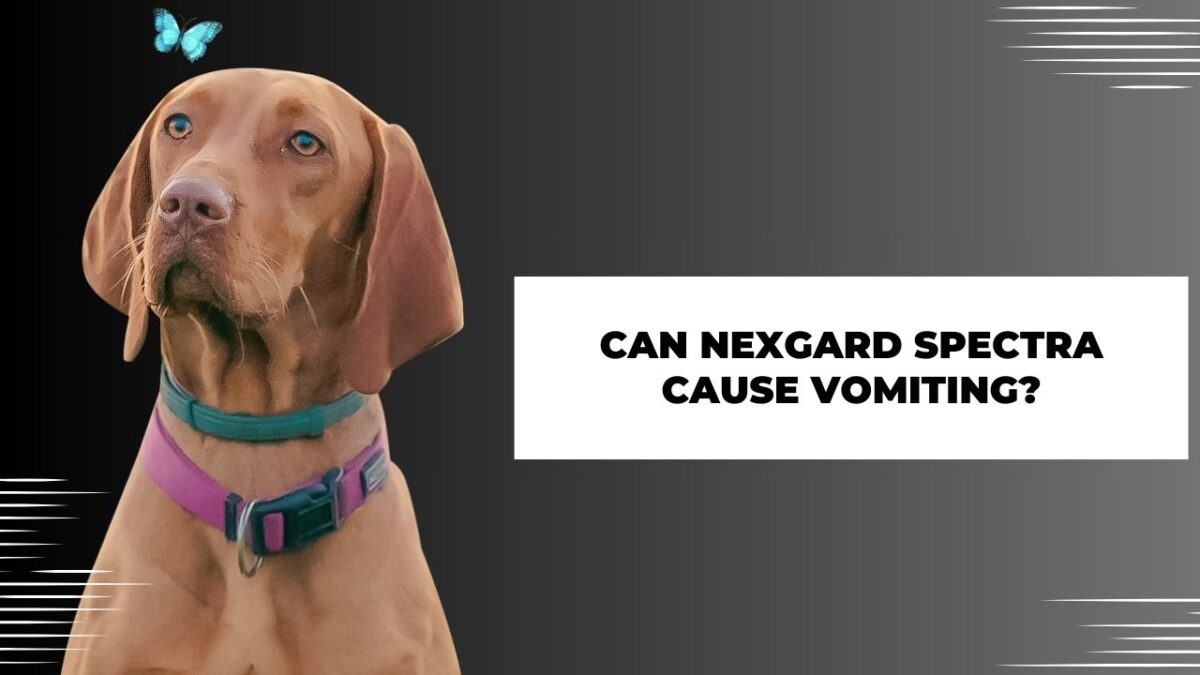Can nexgard spectra cause vomiting? Check Now!

NexGard Spectra is a popular medication used to protect dogs from a variety of parasites. However, like any medication, it’s essential for pet owners to be aware of potential side effects, including vomiting.
Understanding NexGard Spectra
NexGard Spectra is a chewable tablet designed to prevent fleas, ticks, heartworm, and intestinal worms in dogs. Its active ingredients, afoxolaner and milbemycin oxime, work together to provide comprehensive protection against these parasites.
Possible Side Effects
While NexGard Spectra is generally safe for most dogs, it can cause side effects in some cases. These side effects may include vomiting, diarrhea, lethargy, and decreased appetite. It’s crucial for pet owners to be aware of these potential reactions and to monitor their dogs closely after administering the medication.
Can NexGard Spectra Cause Vomiting?
Vomiting is listed as a possible side effect of NexGard Spectra. However, it’s essential to understand that not all dogs will experience this reaction. Factors such as the dog’s health status, age, and sensitivity to medications can influence the likelihood of vomiting occurring.
Managing Side Effects
If a dog vomits after taking NexGard Spectra, pet owners should monitor them closely. In most cases, the vomiting will be mild and resolve on its own. However, if vomiting persists or if other concerning symptoms develop, such as diarrhea or lethargy, it’s essential to contact a veterinarian for advice.
Consulting a Veterinarian
If pet owners have any concerns about their dog’s reaction to NexGard Spectra or if they have questions about potential side effects, it’s crucial to consult a veterinarian. Veterinarians can offer guidance on managing side effects and may recommend alternative treatments if necessary.
Potential Factors Contributing to Vomiting
While vomiting can occur as a side effect of NexGard Spectra, several factors may influence its likelihood and severity in individual dogs.
1. Sensitivity to Active Ingredients
Some dogs may be more sensitive to the active ingredients in NexGard Spectra, particularly afoxolaner and milbemycin oxime. Factors such as age, breed, and underlying health conditions can affect how a dog’s body metabolizes these ingredients, potentially increasing the risk of adverse reactions like vomiting.
2. Incorrect Dosage
Administering the incorrect dosage of NexGard Spectra can also contribute to vomiting. Pet owners must follow the veterinarian’s instructions precisely when administering the medication, ensuring that the correct dosage is given based on the dog’s weight. Giving too much of the medication can overload the dog’s system and lead to gastrointestinal upset, including vomiting.
3. Concurrent Medications
Dogs taking other medications simultaneously with NexGard Spectra may be at a higher risk of vomiting. Certain drugs can interact with NexGard Spectra, either potentiating its effects or causing additional side effects. Pet owners should inform their veterinarian about any other medications their dog is taking to prevent potential interactions and minimize the risk of adverse reactions.
4. Underlying Health Conditions
Pre-existing health conditions can increase a dog’s susceptibility to vomiting when taking NexGard Spectra. Dogs with gastrointestinal disorders, liver or kidney disease, or other chronic illnesses may be more prone to experiencing adverse reactions to medications. In such cases, veterinarians may recommend alternative parasite prevention options or adjust the dosage of NexGard Spectra to minimize the risk of vomiting.
5. Individual Sensitivities
Just like humans, dogs can have individual sensitivities to certain medications. While NexGard Spectra is generally well-tolerated by most dogs, some individuals may have a heightened sensitivity to the ingredients, making them more likely to experience vomiting or other adverse reactions. Pet owners should be attentive to their dog’s response to the medication and report any unusual symptoms to their veterinarian promptly.
Conclusion
While vomiting is listed as a potential side effect of NexGard Spectra, it’s not guaranteed to occur in every dog. Pet owners should be aware of this possibility and monitor their dogs closely after administration. Consulting a veterinarian is essential for addressing any concerns or adverse reactions.
FAQs
1. What should I do if my dog vomits after taking NexGard Spectra?
– If your dog vomits after taking NexGard Spectra, monitor them closely and contact your veterinarian if vomiting persists or if other symptoms develop.
2. Are there any alternative treatments for vomiting caused by NexGard Spectra?
– Your veterinarian may recommend alternative flea and tick treatments if your dog experiences vomiting with NexGard Spectra. Always consult with them for personalized recommendations.
3. Is vomiting a common side effect of NexGard Spectra?
– Vomiting is listed as a potential side effect of NexGard Spectra, but it is relatively uncommon. Most dogs tolerate the medication well without experiencing vomiting.
4. How quickly should I expect NexGard Spectra to start working?
– NexGard Spectra typically starts working within 24 hours of administration and provides protection against fleas, ticks, heartworm, and other parasites for up to one month.
5. Can NexGard Spectra be given to dogs with sensitive stomachs?
– NexGard Spectra may be suitable for dogs with sensitive stomachs, but it’s essential to monitor them closely for any adverse reactions. If vomiting or other symptoms occur, consult your veterinarian for advice on alternative treatments.







